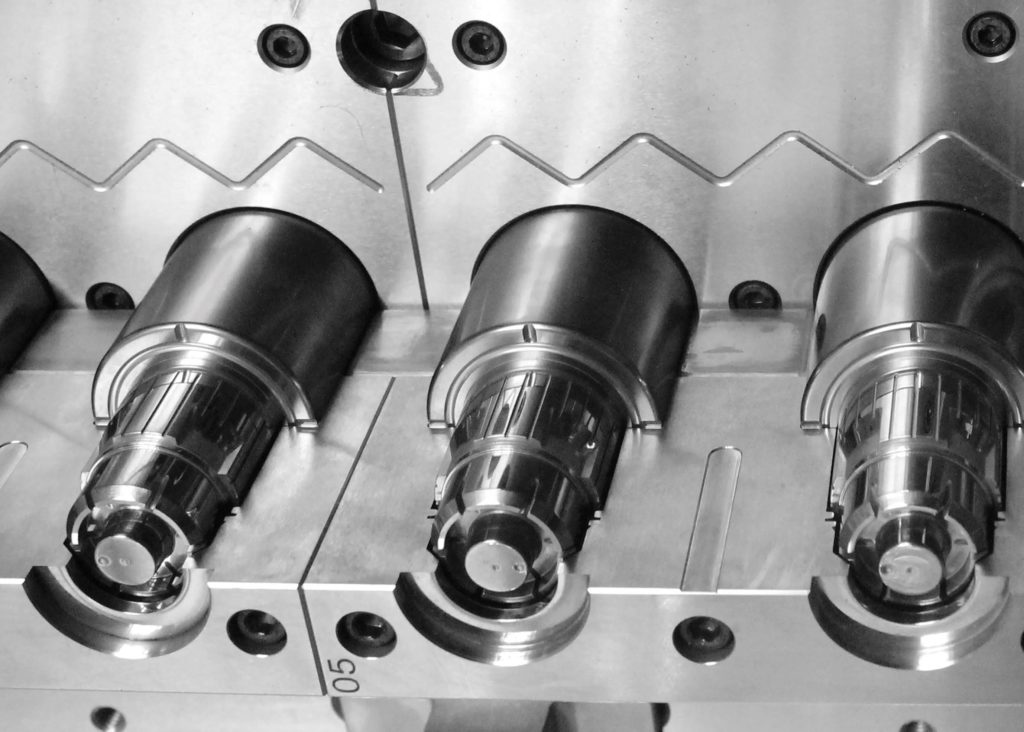Interview with Lino Pastore, Sales manager of Giurgola Stampi
 Giurgola Stampi (MB) operates in the design and manufacturing of injection moulds for plastic materials intended for the sectors of pharmaceutical, packaging, body care, House care and aerosol. It is specialized in the volume-manufacturing of equipment for the moulding of caps, dispensers, threaded caps and, and especially of screwing moulds and flip top caps. Since the Eighties until today, they have constantly upgraded their production department, with the adoption of forefront technologies, making production processes leaner, but especially investing in the staff’s training and updating.
Giurgola Stampi (MB) operates in the design and manufacturing of injection moulds for plastic materials intended for the sectors of pharmaceutical, packaging, body care, House care and aerosol. It is specialized in the volume-manufacturing of equipment for the moulding of caps, dispensers, threaded caps and, and especially of screwing moulds and flip top caps. Since the Eighties until today, they have constantly upgraded their production department, with the adoption of forefront technologies, making production processes leaner, but especially investing in the staff’s training and updating.
Together with Lino Pastore, Sales Manager of Giurgola Stampi and former President of Ucisap, a “4.0-compliant” reading of the Tool Sector, of its potentialities and of the challenges issued for the next future.
Innovation: experimenting new industrial applications or choosing new technologies?
Both. The first turning point for Giugnola Stampi was starting the all-round implementation of the production cycle. The mould is made in co-design with customers, which are supported also in the equipment start-up phase, up to the commissioning. This has allowed us to understand companies’ requirements more in-depth, from the required process to the final mould. To make it possible, we have invested in advanced machines completed by a robotic work isle, which has allowed us to shorten and to optimize production times, in virtue of higher standardization. To exploit machines and technologies at best – today available for whatever company – we need, however, good design ideas and innovative mentality, a new entrepreneurial culture. This is the real change worth making ‘to create innovation’, from the management to manufacturing divisions. We must start thinking of production differently, to approach Industry 4.0 successfully.
Industry 4.0: how to make it concrete and with what future targets?
Essentially, through the staff’s training. The technological adaptation is fundamental to make companies competitive in the panorama 4.0, but at the same time we must help people working in its inside to understand how implementing new production courses and how to make them efficacious. The Smart Factory implementation mostly starts from the reading and the analysis of machine and process data, real added-value of this industrial transformation. Therefore, its use is indispensable for the achievement of higher manufacturing efficiency.
The Italian entrepreneurial reality is mainly characterized by SME, small enterprises that are however structured to supply even complex markets. The professional updating can allow all these companies, Italian toolmakers, to become stronger, despite their sizes, both in Italy and in the international market. Then, it is important to employ new more specific professional figures in companies, being aware that technology is useless without man. Giurgola bought its first automated isle in 2011, long before 4.0 was at stake, and has been working through interconnected plants for several years. Nevertheless, some time was necessary to let operawtors learn how to run machines at best and understand how to manufacture in a new modality. The production of multi-cavity moulds requires in fact complex processes, often hardly managed in conventional manner, too. The professional and motivational training was then a fundamental stage.
Today we are working at a refinement of the connectivity of our operating software, from the data coming from the productive managerial one to those provided by sales and administration offices.
[su_box title=”IDENTIKIT” box_color=”#89b9de”]Company: Giurgola Stampi Srl, Via G. Leopardi 13, 20836, Capriano di Briosco (MB) Reference person: Lino Pastore – Sales Manager Products: Multi-cavity injection moulds for plastic materials and unscrewing moulds for the production of flip top caps, closures for Drinks, soft drinks and Temper evident Warranty seals. Sectors: Packaging, pharmaceutical, cosmetics, Body Care, House Care, Aerosol Technologies: automated isle robotized with Anthropomorphic Robot with press change mounted on rail that serves three 5-and 3-axis milling machines, two plunge EDM machines, conventional and horizontal machining centres, universal and thread grinding machines, CNC lathes for roughing and finishing, 3 multi-material injection presses, from 80 to 650 tons, for mould testing. Software: Cad/Cam, 3d System (Cimatron), diversified managerial software for Administration, CRM Production. Average delivery terms: 25 weeks Export: 50% – Europe, Middle East and South America Website: http://www.giurgolastampi.com/ Social networks: Facebook; Linkedin: https://www.linkedin.com/company/giurgola-stampi-srl/?originalSubdomain=it Contacts: ph. 0362 913233 – email: lino@giurgola.it[/su_box]
Italy, foreign Countries or both? What market strategies companies cannot underestimate?
In this ambit, I always reason with ‘two hearts’. The one as former Ucisap President and as entrepreneur. Italian companies often struggle to be competitive, both in the domestic market and abroad. They receive few aids and they have an excessive export propensity.
It would be necessary to support them in strengthening their production, to make them more willing to keep their business in Italy, looking at foreign Countries mainly as strategic places where to set up sales offices or technical branches. I think that delocalization is not the best way for our companies’ growth.
Today Giugnola Stampi is present with its moulds all over the world and exports 50% of its production. It maintains its core business in Italy, besides Middle East and South America nations. Mostly for the packaging industry.
European funds, internationalization incentives and business networks. An added-value or an opportunity worth seizing?
An opportunity we must still understand. Italian companies still use public funds insufficiently. Reference Bodies and Institutions are expected to provide more direct and simple communication, able to involve companies to a higher extent. Moreover, it is worth adding that funds are quite useless if they do not support a strong entrepreneurial idea. They are an additional resource to be exploited but as reinforcement of a well-defined corporate strategy, maybe in a logic of networking, of business collaboration. Italian entrepreneurs’ radical change of mentality is necessary in this case, too. Our companies often prefer working autonomously but individualism does not strengthen, it can only deprive of interesting market opportunities.
The tool sector in 10 years. What markets, products and technologies?
Ten years are many to envisage the evolution of our sector. The advent of 4.0 will certainly and gradually change business modalities. The tool world will become more efficient, but with the risk of levelling out. Companies will be induced to align with competitors to survive, maybe giving up the artisanship wit. A strong and a weak point at the same time.
Besides, I believe that small enterprises will be increasingly called to join one another to remain on the market, to merge with bigger realities and to share their know-how to satisfy customers’ demand in complete and structured manner, on both domestic and international scale. The destiny of Giugnola Stampi will be probably this, too: working with other enterprises or being taken over by a bigger-size company. We will see. ′



